I never meant to move to France. Nice started out as a three-month plan – a season to practice French, sit by the Mediterranean sea, maybe work on my tan. I wasn’t drawn to Paris, I wanted the coast and the sunlight.
Soon Nice, without me even noticing, became the place I couldn’t leave behind.
I met a boy, I came back, I left again, and then I returned. Before I knew it, mornings were marked by the local market on Cours Saleya, by the smell of warm bread and fresh produce. Afternoons meant coffee on Rue Bonaparte or wandering to the port. Weekends turned into train rides to small towns that smell like stone and sea salt.
Nice quickly became home, weaving itself into my days until I found myself in a Mediterranean lifestyle I hadn’t known I was missing.
If you’ve ever wondered what it might be like to build a life here – beyond the postcards and quick trips – this is the guide I wish I’d had. The one that answers the questions friends always ask:
- What it’s like as a foreigner
- How much does it cost
- Where do I live
- How do visas actually work
- Plus the little truths that don’t show up in travel brochures.
Short on time? Here's the cheat sheet
💭Living in Nice means getting the best of both France and Italy
🏠Although Nice is compact, each neighborhood has it's own vibe. Port / Place Garibaldi / Riquier ges my vote on the best areas to live.
📚Make your transition easier and get a headstart learning the language with Mondly.
🛂If you're not from an EU country, you'll need a visa to live here. Luckily there are options but French bureaucracy is not known for speed.
🤕Don't rely on luck alone. SafetyWing now offers 2 types of Nomad Insurance coverage options: Essentials for travelers and Complete for expats and digital nomads.
☂️Although making friends can be hard in your 30s,
🏖️Living in Nice means close proximity to so many wonderful places and a truly stunning place to call home.
What It’s Like for Foreigners
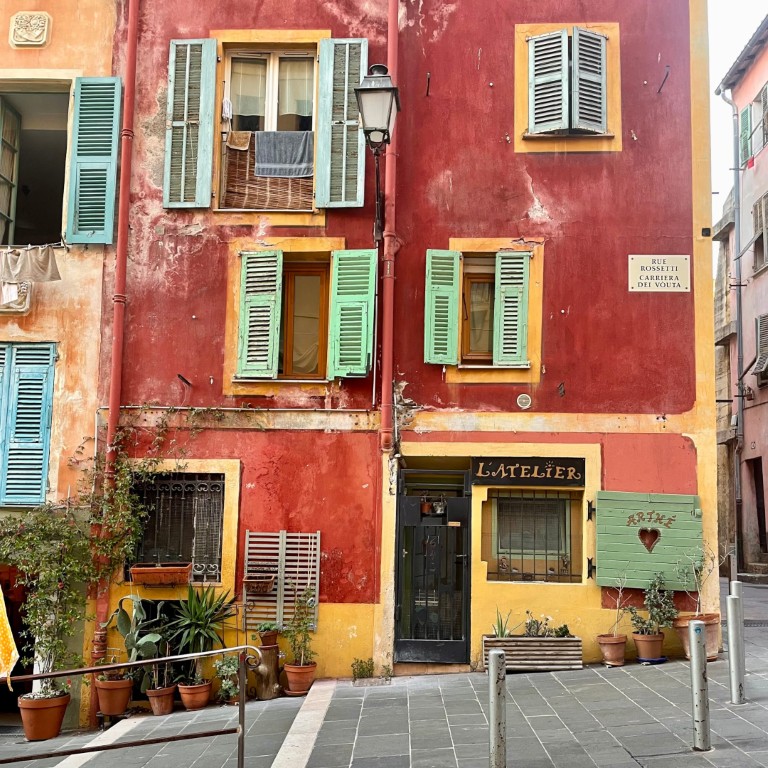
Nice is undeniably diverse. Its international airport is the second most-visited airport in France. Each summer, tourists pour in by the busload and cruise ships dock, while the promenade fills with visitors from around the world.
But beyond that constant hum of tourism, there’s a community of expats, retirees, and digital nomads.
Learning French
For them, and for newcomers like me, it’s surprisingly easy to feel at ease here. Most french people speak English, which makes daily life manageable. But when you try French – even with mistakes – you’ll usually get a bit more patience. Locals might slow down, correct you, or just nod and move on. They won’t shower you with praise, but they’ll notice the effort.
Depending on your goals, I recommend these apps/platforms for language learning:
- Drops: Use the free version of this app for 5-minutes of vocab lessons a day. This is good for improving vocab but little else.
- Mondly: If you want to have a little bit more practice, this app is similar to Duolingo but has less silly prompts and more realistic phrases and sentences.
- Babbel: Babbel is similar to Mondly but also teaches cultural tidbits during the language lesson.
- iTalki: If you're more serious about learning to speak the language, this platform allows you to have 1:1 or group lessons with native teachers.
Making Friends
The expat community has its quirks. There are plenty of British and Australian retirees, and of course some Americans. But I don’t meet many people my age – I’m 31, and most of the foreigners I’ve encountered here are older or established in careers they could transfer abroad.
If you’re in your 20s or 30s, don’t expect to stumble into a thriving English-speaking community like you might in Lisbon or Barcelona. But you’ll find your people eventually, especially if you’re willing to weave yourself into French Riviera life.
The Day-to-Day
Day-to-day life is manageable. I don’t have French health insurance yet, and still, I see the dentist, I get bloodwork done, I book appointments with doctors. It’s all affordable, shockingly so compared to the U.S.
Nice makes room for you, whether or not you're 100% settled. You don’t need to have all the boxes ticked to access what you need.
Cost of Living
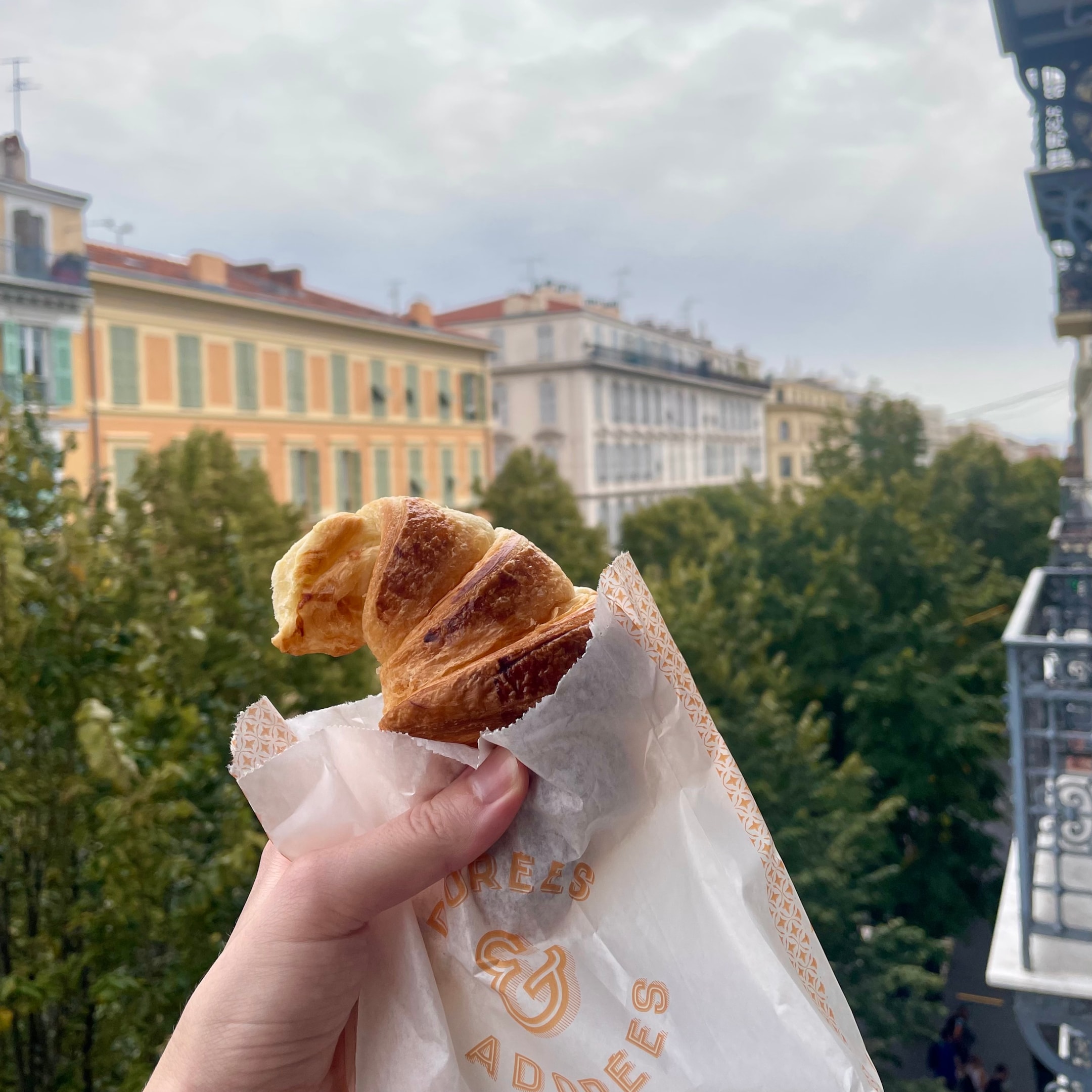
Coming from California, living in Nice feels wildly affordable.
Housing Costs
Rent for a nice one bedroom apartment in a good neighborhood hovers around €1,200. A three bedroom apartment is likely €2,000. Not cheap by French standards, but compared to average rent in San Francisco, a dream. Housing prices are also relatively low compared to U.S. standards.
Food Costs
Groceries are where the magic happens. I’m always surprised when I leave the store with a week’s worth of food for €50. The boulangeries are even better: croissants for €1, baguettes for pocket change. The pastries are golden and flaky, the kind you tear apart on the sidewalk and eat warm. One bite and you start to believe life really might be simpler here.
Eating out, though, is the splurge. Restaurants know tourists will pay, and you’ll notice. A three course meal can easily cost €40–50 per person. My advice: cook at home often, and when you eat out, make it count. Pick the tiny trattoria in the backstreets, the seafood spot by the port, or the place your neighbor recommends.
Healthcare
Healthcare deserves its own mention. Even without carte vitale (French health insurance), I’ve paid €25 for a doctor’s appointment. Cavity fillings and x-rays? Still reasonable. It’s one of the ways France takes the edge off being a foreigner: you don’t need to panic if you get sick or need care.
The system is set up for daily expenses to be accessible.
Neighborhoods to Live in
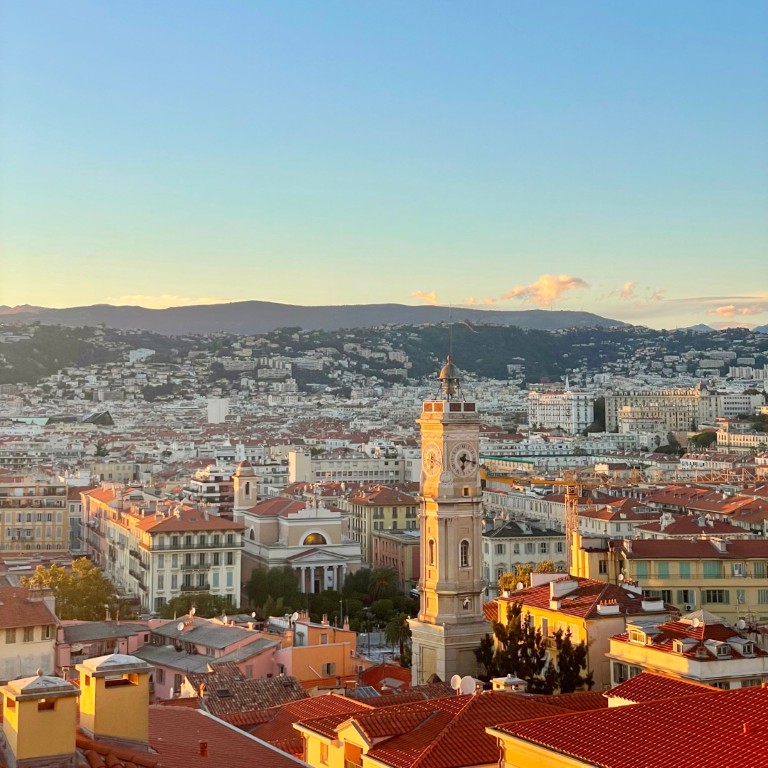
Nice is small enough that you can get around quickly, but each neighborhood has its own flavor.
Wherever you land, know this: Nice is walkable. The tram system is reliable, and the city center never feels sprawling. You’ll always be close to the beach, too.
Vieux Ville (Old Town)
The one on every postcard. Narrow alleyways, ochre-colored buildings, shutters painted turquoise and green. So many restaurants and cafes sit outside your doorstep, with splendid views of the sea.
It feels more Italian than French, and honestly, it’s stunning. Staying there feels like living in a painting.
But the tradeoff is noise – sound bounces between those narrow streets. If you choose vieux Nice, pick a side street, not the main drag, unless you want to hear the parties until 3 AM every night.
Port / Place Garibaldi / Riquier
My home, and biased favorite. The port is lively but still feels residential. Cafés, restaurants, art galleries, and wine bars are clustered around Rue Bonaparte.
Riquier is a little quieter, a little cheaper, but still close to the city center. The train station is right there – from my front door, I can be in Monaco in 20 minutes. That never stops feeling surreal.
Musiciens / Thiers / Quartier d’Or
More elegant, with Belle Époque buildings and wide streets leading to the promenade des anglais. It’s close to the Basilica of Notre-Dame and the main shopping streets.
Friends who live here love the balance: central, pretty, but not too loud.
Villefranche-sur-Mer
Technically its own town, but just a ten-minute train ride from Nice. Pastel houses spill down the hillside to a crescent-shaped bay, and the beaches here feel calmer. It’s quieter than Nice, with a small-town feel, but close enough that you can dip into city life whenever you want.
If you dream of mornings swimming before work and evenings with a glass of rosé overlooking the harbor, this is the spot.
Other Places in France to Consider
While I love living in Nice, if you're not completely sold, consider instead:
Visa Options to Move to France
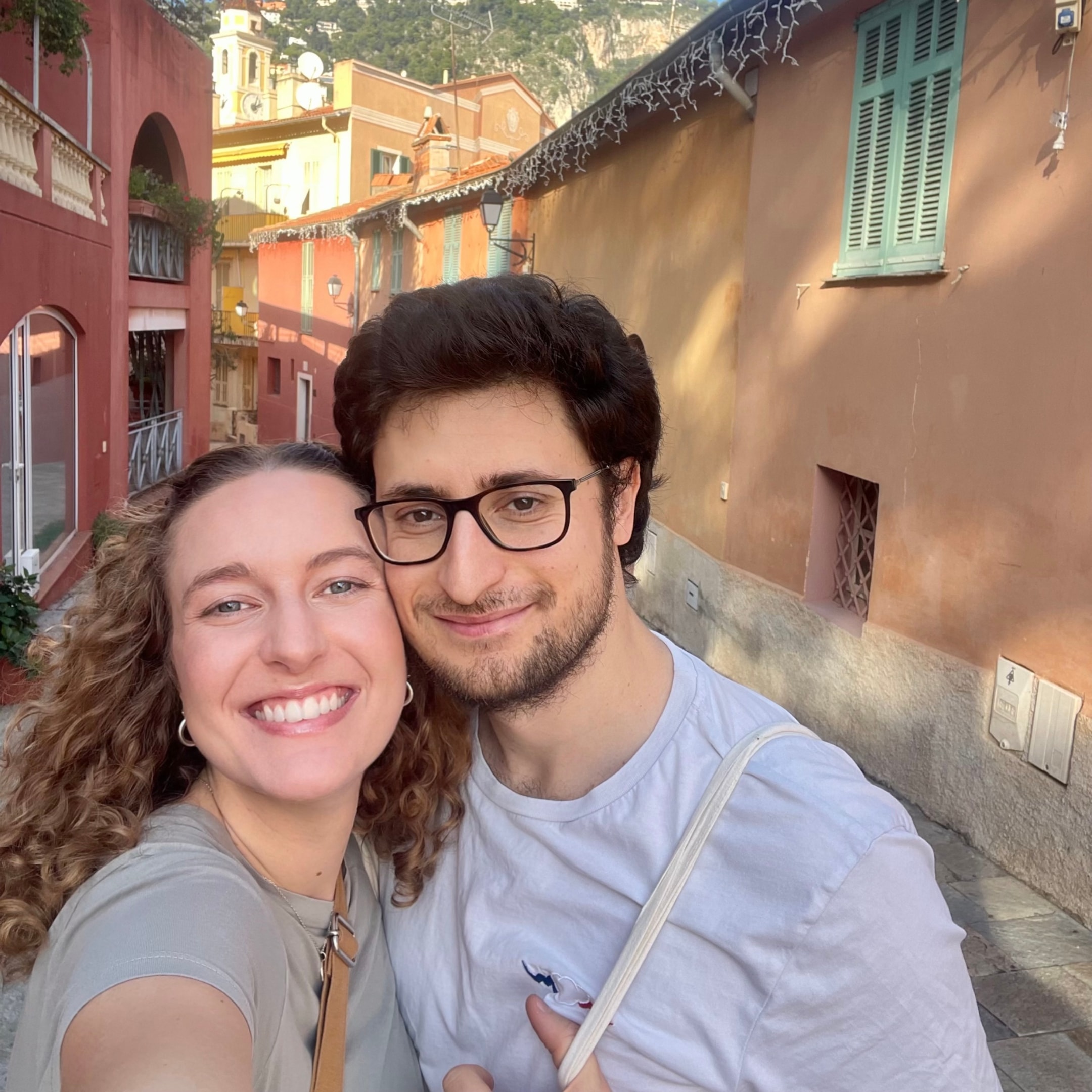
Here’s the not-so-glamorous truth: visas in France are complicated but a necessary thing to navigate when trying to sort out how to move to France.
For a while, I lived on the tourist cycle – three months in the Schengen zone, three months out. I’d come to Nice, then hop to the U.K. or back to the States when the clock ran out. It worked for a time, but it wasn’t sustainable.
Next, I applied for a carte de séjour, a long-stay visitor visa. It lets you live in France for a year, but you can’t work for French companies. You have to prove financial means – basically, show you have savings or income that will support you for the entire year. It was enough for me, since I work remotely for U.S. clients. But the process was long. I worked on my initial visa for nine months and it got rejected multiple times. It was brutal.
Eventually, things shifted. My partner is French, and we entered into a PACS – a civil partnership – which gave me a new path to residency. We’re working on my visa based on that now, called the visa privée et familiale. It’s proof of a shared life: joint bills, bank accounts, addresses. Again, not easy. Again, slow. But this is France, and bureaucracy is to be expected.
Another option many expats take is to move here on a student visa to learn French.
If you’re considering the move, know this: patience will be your closest companion. And if you’re not up for trial and error, hire an immigration attorney. They know the nuances of work permits, work visas, buying property etc., and they’ll save you months of confusion.
Pros & Cons of Living in Nice

The Pros
Nice might be the most beautiful city in France – and I’ve seen a lot of them. It’s France and Italy rolled into one: French culture with Italian influence, pizza next to pissaladière.
The local Niçois cuisine is hearty and unique, and every corner bakery has its own take on classics.
The proximity to other places is unbeatable. Want to hike in the Alps? Take a train. Want pasta in Italy? You’re 45 minutes away. A day trip to Monaco? Easy.
Winters are mild, the Mediterranean climate is gentle, and the pace of life moves slowly. The overall mindset here is that quality of life comes before everything else.
The Cons
Summer heat is no joke. With no AC in most apartments, August can feel like survival mode.
Bureaucracy will test your patience daily – from opening a bank account to signing up for utilities.
And if you’re younger, the expat community can feel thin. Making friends takes effort, especially if you don’t already have connections. Nice is warm, but it’s not instantly welcoming in the way some bigger cities can be.
What I Wish I Knew Before Moving to Nice, France
Things move slower here, and not always in a romantic way. Offices close for weeks on holiday. A document might sit on someone’s desk for months before being processed. Nothing runs on your timeline.
I also wish I had understood French directness better. The French aren’t rude, but they are honest. They’ll tell you the truth, even if it stings. Over time, it becomes refreshing. When someone offers a compliment, you know they mean it.
And language – yes, everyone speaks English, but that doesn’t mean you should coast on it. Learning French changes everything. Even if you stumble, the effort builds bridges. My French improved more from ordering produce at the market than any app. The practice matters.
The last thing: get help. Taxes, visas, business registration – don’t try to do it all alone. Professionals exist for this exact reason. Save yourself the stress. Otherwise, you’ll waste precious months fighting a system you won’t win against, and you'll miss the beauty of the place you now call home!
Will You Try Living in Nice?
Although there are plenty of other French cities and towns to beg for your attention, Nice is unique. The combination between Italian qualities alongside French roots is something on most days I love. Just pack your patience as you navigate the not-so-fun-sides of moving abroad and you'll be in for a treat.







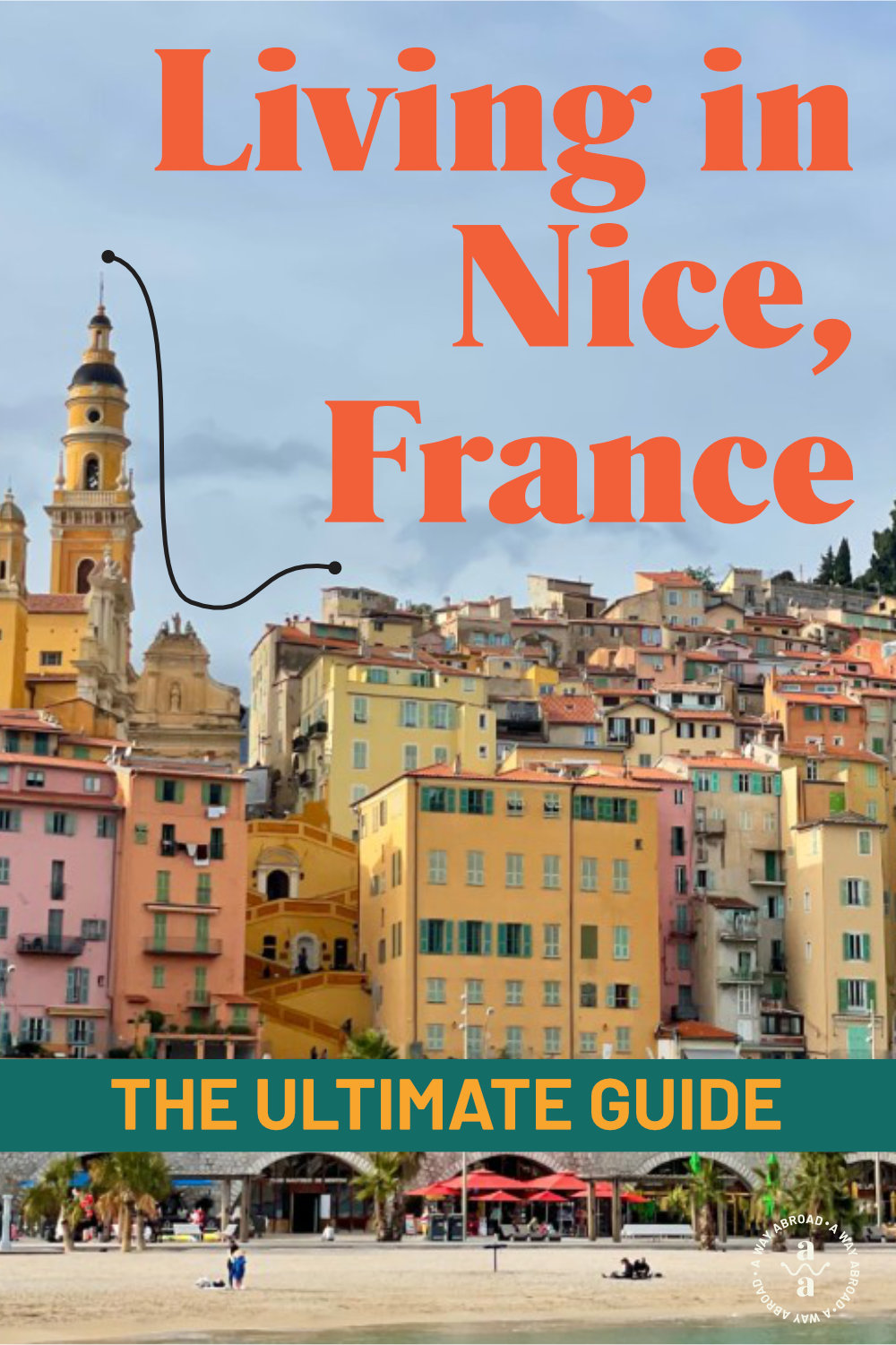

.png)
.png)